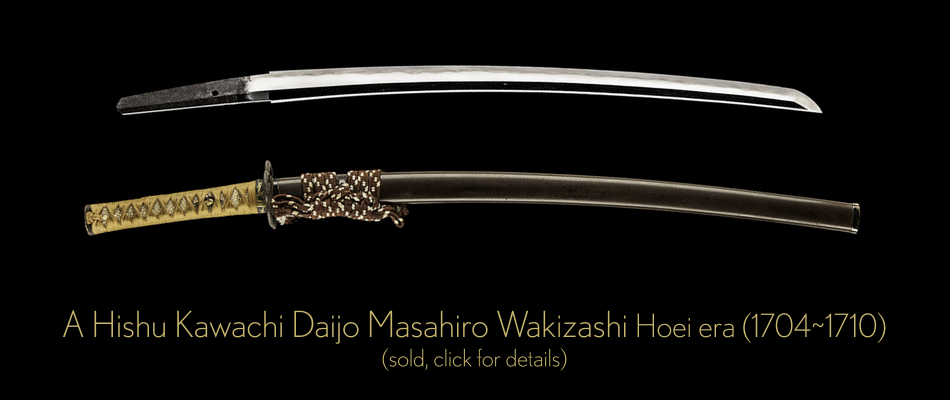I get this question a lot. From family, from friends, from clients, ”why do you love Japanese swords so much?”
In the past I’d reply in a bewildered kind of way, “…I don’t know, I just do.”
And then I’d go into a rather awkward lengthy explanation on how I appreciate their beauty, their history, trying hard to explain that quintessential feeling I get every time I hold a Japanese sword in my hands.
It’s never very straightforward.
It is without question that Japanese swords have changed and influenced my life quite profoundly. And so I have done a fair amount of soul searching as to why I believe I love these wonderful works of art.
It’s literally taken me a few years to write this article. I want to share these thoughts about the Japanese sword because I know there are many more people out there that connect in the same way I do.
**Note: These seven reasons are by no means a complete list (there are many more, so this is more like a top 7) and they not in any order of importance.
Each reason interacts with the other in a spiritual kind of way:
Reason #1 – All that History…
First of all, the history grabs me every time. I mean, how could it not?
The majority of the Japanese swords in existence are antiques that are several hundred years old.
That’s right, around the time Christopher Columbus was out there with his crew, on the ocean blue, back in 1492, a katana was being forged in Japan.
And I can quite easily hold one today, and I happen to own some much older.
My mind drifts off to distant places and faraway lands. What happened in the world at the time this sword was made? If this sword could talk, what would it say?
Not surprising given their importance and tradition in Japanese culture, Japanese swords and their smiths are very well documented in scores of books (most of which are in Japanese, but English translations are growing).
So it’s very possible to build a complete story of where the smith worked, his general rank, whom he studied under, the symbolism of the artwork on the fittings, and often the families that likely owned the swords themselves.
It’s such a pleasure to discover the full story and the story has a tendency of becoming even more complete over time.
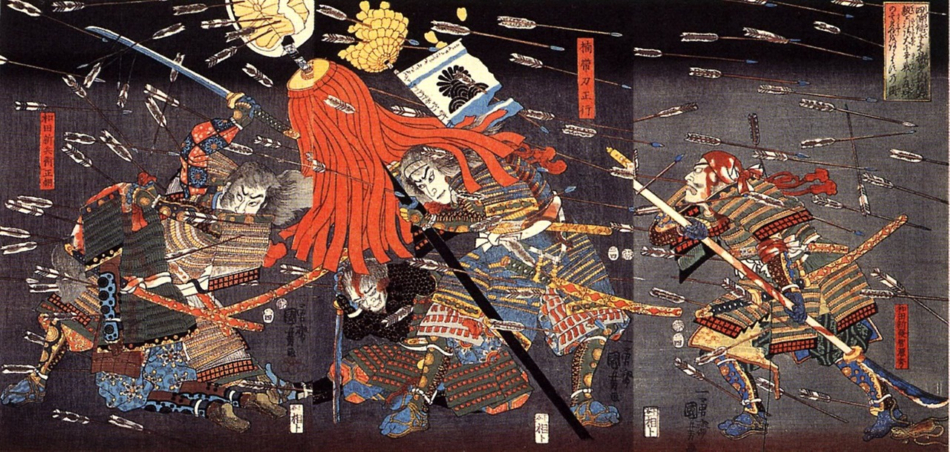
(The last stand of the Kusunoki at Shijo-nawate under a hail of arrows in 1348: Genshu (right), Masatsura (center) and Masatomo (left) – from thebudosite.com)
Reason #2 – Memories of Japan
I lived in Japan for almost 20 years; I first travelled to the country in November of 1993 after graduating from university in Canada.
Thankfully, I continue to travel a few times throughout the year. I now live with my wife, Donna, and our three children, Hannah, Lennon and Nelson in the UK.
Without a doubt, my Japanese swords (especially my first Japanese sword) keep me close to Japan. The sword is like a memorial bridge that stretches from my hands all the way to that small special island.
Every time I oil the blade, take in its subtle beauty sword I think of my time Japan; the memories of the country, how I met my wife there, how our kids spent their first years there, started a business in the country, all the friends I met, the grandeur of Tokyo, the amazing sushi, the list goes on!
Japan is a very unique country and for anyone who has visited the country, it’s hard not to be influenced in some significant way.
A Japanese sword encompasses the magic that is Japan in a single object.
A Japanese sword has a soul.
A Japanese sword has a soul.
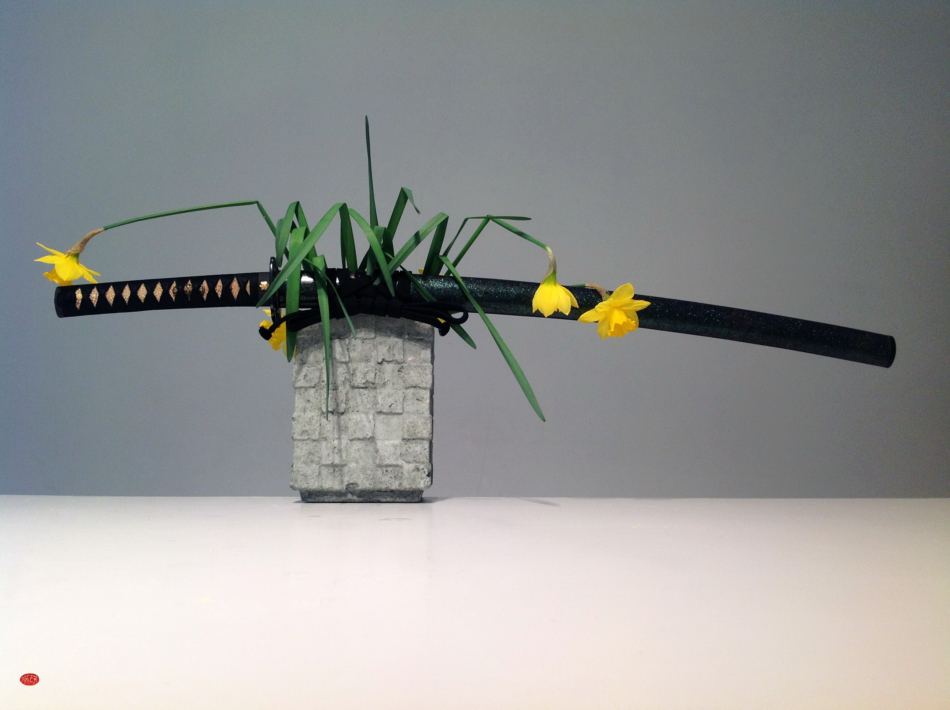
The Way of the Warrior – Ikebana Artistry by Donna Canning
Reason #3 – Life is precious, so make the most of it
For obvious reasons, a Japanese sword is a keen reminder of the preciousness of life itself.
My swords forever remind me of the incredible beauty of life, just the fact that we live on this planet and we even exist! I mean c’mon, life is a miracle!
But life is also not forever, at least in a physical form. As such, the Japanese sword has influenced me to become even more aware of my own mortality.
And how it is our duty must make every day that we live count for something.
I am fully aware that my collection of Japanese swords will far outlive my lifetime. Therefore at some point in my life, I will hand down certain swords to my kids to take care of, to be responsible for their (and their own) continued well-being, and hopefully remember me by in the process.
Our kids are too young to understand this now, but it’s important that the swords don’t represent a sense of sadness for them when I am gone.
They need to be regarded as a source of inspiration; to live life with purpose and conviction and that I will always be in their hearts.
Reason #4 – Simplicity is truly what matters
The fact that the sword does not require batteries or electricity for it to be fully charged is refreshing to say the least.
A Japanese sword is made up of iron and carbon. That’s it, pure steel. And in the process of its creation it needed just human energy, a few tools, water, wind, and fire.
This inherent simplicity, yet unsurpassable technical brilliance carries a big message. And this kind of simplicity is what clearly inspires the most admired creations today.
If you think about it, the finest cars, the sharp suits, the latest gadgetry, the most inviting homes will all share sense of cleanliness and simplicity in their core essence.
And this kind of philosophy transcends to our home, my office and even our buying habits.
Heck, we don’t even have a car because we prefer to walk and take public transport (in concentrated Tokyo having a car was pointless and we got used to this lifestyle, people think we are a bit nuts).
While I would probably stop short of saying that our home is minimalist, getting rid of the excess clutter opens up possibilities and frees the mind.
It’s hard to fight ‘filling up’ spaces, but it’s vital that you do. We all know that a messy physical environment causes our brains to freeze.
Choose what you cherish the most and remove the rest.
Enjoy the simple pleasures of life, always. And this also transcends into cherishing the personal relationships we have with family and friends.
Reason #5 – The importance of teamwork
Many people first assume that a particular completed Japanese sword was made by a single Japanese swordsmith. This is not completely accurate.
While the focal point of a Japanese sword is the sword itself, a great many craftsman specializing in his or her own respective trade will see the sword to its fruition along with the smith.
Here are diagrams of most of the fittings that make up a completed Japanese sword.
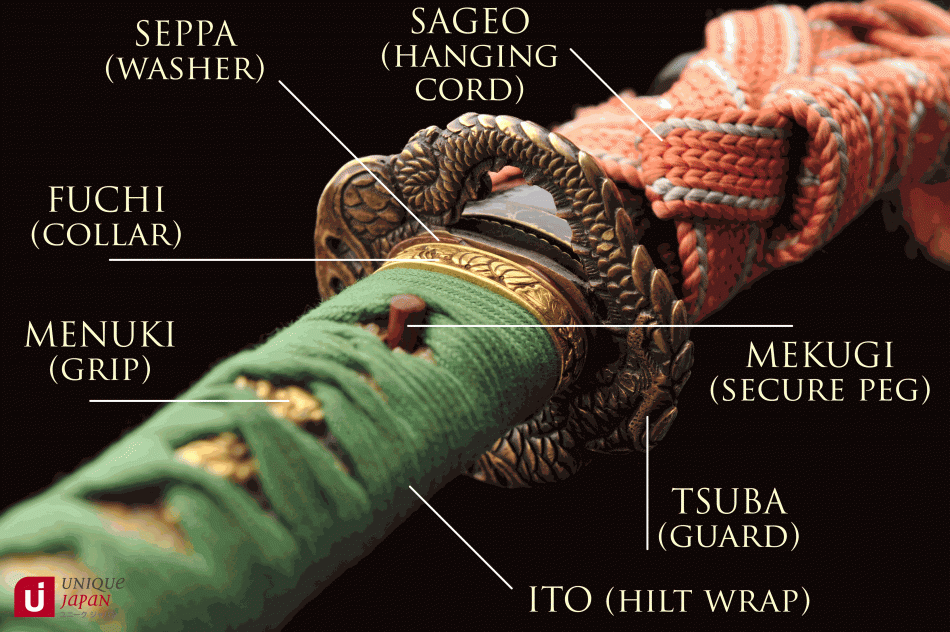
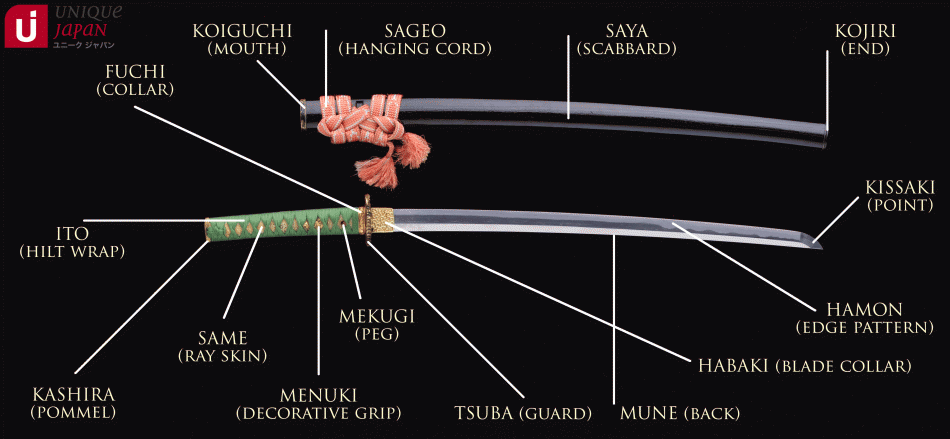
A typical Japanese sword will involve the following unique craftsmen:
- Swordsmith who produces the sword (with help from his apprentices)
- A polisher to bring out the beauty of the steel and make the sword razor sharp (the polisher is equally as important as the smith really)
- The maker for the habaki (this helps secure the sword in the shirasaya)
- The maker of the shirasaya (magnolia scabbard)
- The maker of any horimono (engraving) if engraving is desired
- The maker of the tsuba (guard)
- The maker for the seppas (copper spacers/washer sometimes wrapped in gold to secure the tsuba)
- The maker of the fuchi (collar) and kashira (pommel), often the same person (the tiniest of detail in these works of art is so impressive)
- The maker of the menuki (decorative grips in the hilt)
- The maker of the tsuka (hilt) and wrapping of the ray skin and Japanese silk
- The maker of the saya (scabbard) and lacquering it, sometimes with a separate artist who places a design or family crests on the scabbard
Now that’s teamwork. And there can easily be more people involved in the process!
Every Japanese Samurai sword is completely unique. It’s the ultimate example of form meeting function and the greatest of all swords ever made.
To steal a line from The Highlander, “there can be only one!”
The point is that each craftsman compliments each other’s work for a greater overall outcome. Each striving for perfection with relentless passion.
There is a lot of truth to the expression, “if a job is worth doing, it’s a job worth doing well.”
Why must we always settle for mass produced stuff?
Reason #6 – It’s surprisingly affordable
I understand there will be some who may not initially agree with this statement, but if you take into consideration:
- The incredible age of Japanese swords
- The degree of skill to make a proper hand-forged Samurai sword
- The number of craftsmen involved in the making a completed sword
- The preciousness and detail of the fittings metals (often in gold, silver, shakudo, mother-of-pearl, etc.)
- The generally excellent condition they are in (a testament to the care Japanese people show to such artefacts and their overall quality)
- Their inherent beauty and uniqueness
- The list goes on…
Then a Japanese sword is really not that expensive. Plus it can come with certificates of authenticity which further assist to hold their value.
Even the very finest Japanese swords are not even close to costing the millions that famous paintings command.
Reason #7 – Power and responsibility
I’d be the first to admit that a Japanese sword gives me a sense of power. But it’s not like I go into some maniacal frenzy when I hold a sword in my hands.
Quite the contrary, I feel a deep sense of responsibility. The sword actually has a way of clearing my thoughts and focusing.
If there is one lesson to be learned from Samurai ethics and servitude is the importance of taking responsibility of our actions.
We alone are responsible for the quality of the life we live.
Too often we see people play the blame game for whatever goes not quite right. Excuses are just that, excuses and they don’t get us anywhere.
Taking personal responsibility for our thoughts, our words, and our actions holds us to a higher sense of self.
It takes guts. In short, it’s makes us brave.
Be conscious of this has helped make a positive difference to the quality my life and I hope to believe to the lives I thankfully interact with every day.





